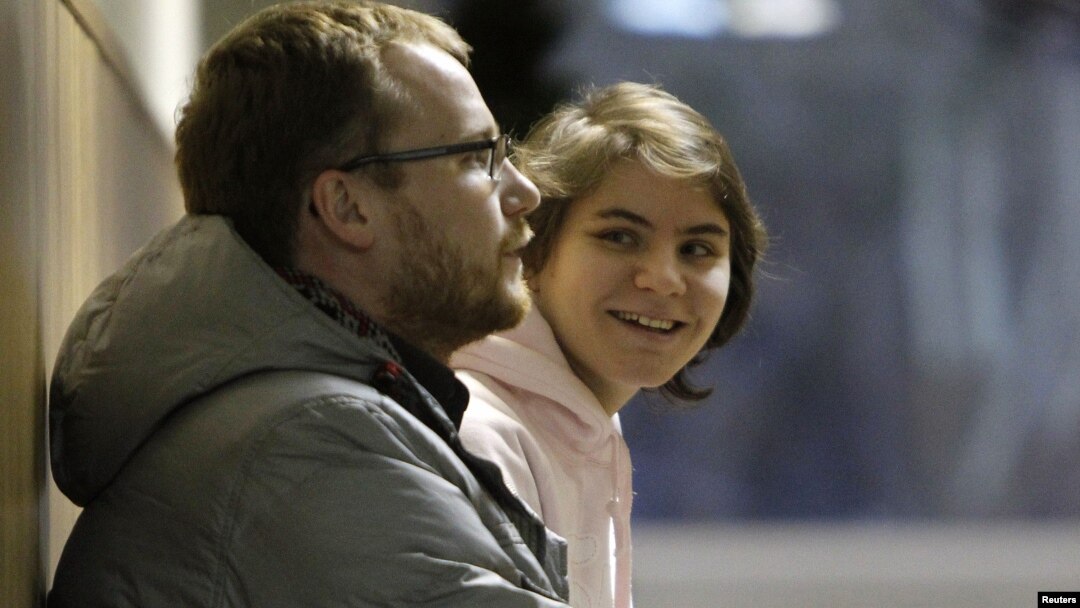MOSCOW —
A Moscow court has ruled the video taken of a Pussy Riot protest in February at Russia’s main Orthodox cathedral should be removed from the Internet, along with all of the band's other videos. The court claims the videos are extremist.
The band’s most highly publicized video shows its members on the altar of Russia’s most prominent Orthodox church calling on the Virgin Mary to deliver them from Russian President Vladimir Putin. The band was protesting Putin’s unprecedented third term as president and the powerful Orthodox Church’s support of him.
The three women were found guilty of hooliganism motivated by religious hatred. Nadezhda Tolokonnikova and Maria Alyokhina are currently serving two-year sentences at prison camps.
Band member Yekaterina Samutsevich was given a suspended sentence.
She said this is clearly censorship of art and the culture of protesting, which she said is important in any country. Samutsevich described the blocking of Pussy Riot’s videos as horrible, and said she plans to appeal. She has filed a complaint with the European Court of Human Rights in connection with the case.
Another video the court called extremist shows the band on Red Square singing a tune entitled “Putin’s Pissed Himself.”
Political analyst Masha Lipman of the Carnegie Center in Moscow says banning the videos is another attempt by the Kremlin to crack down on the opposition.
"This one decision that applies to the video is just one small element out of what has now evolved as a new environment," said Lipman. "An environment that is more oppressive than it was before, in a shift from a mainly manipulative policy of the government with regard to societal activism to a repressive one."
Critics have accused President Putin of launching a mass crackdown on dissent since he took office in May. The Kremlin maintains new laws have been passed to strengthen security and keep the public safe.
Fines for participating in or organizing unsanctioned protests against the Kremlin have increased more than 150-fold; that is more than the average salary of a Russian.
Russia has also expanded its definition of high treason. The new law states anyone who possesses information deemed secret could be jailed for up to eight years for espionage - even if the secrets are not passed to foreign hands. Previous legislation described high treason as espionage or assistance to a foreign state that damages Russia's external security.
As part of the new law, which was drafted by Russia's Federal Security Agency, "external" has been dropped from the definition. As a result, activists who get help or advice from a foreign state or give information to foreign organizations, including journalists, could be charged with treason. Critics said the new law does not require authorities to prove a suspect damaged state security.
The band’s most highly publicized video shows its members on the altar of Russia’s most prominent Orthodox church calling on the Virgin Mary to deliver them from Russian President Vladimir Putin. The band was protesting Putin’s unprecedented third term as president and the powerful Orthodox Church’s support of him.
The three women were found guilty of hooliganism motivated by religious hatred. Nadezhda Tolokonnikova and Maria Alyokhina are currently serving two-year sentences at prison camps.
Band member Yekaterina Samutsevich was given a suspended sentence.
She said this is clearly censorship of art and the culture of protesting, which she said is important in any country. Samutsevich described the blocking of Pussy Riot’s videos as horrible, and said she plans to appeal. She has filed a complaint with the European Court of Human Rights in connection with the case.
Another video the court called extremist shows the band on Red Square singing a tune entitled “Putin’s Pissed Himself.”
Political analyst Masha Lipman of the Carnegie Center in Moscow says banning the videos is another attempt by the Kremlin to crack down on the opposition.
"This one decision that applies to the video is just one small element out of what has now evolved as a new environment," said Lipman. "An environment that is more oppressive than it was before, in a shift from a mainly manipulative policy of the government with regard to societal activism to a repressive one."
Critics have accused President Putin of launching a mass crackdown on dissent since he took office in May. The Kremlin maintains new laws have been passed to strengthen security and keep the public safe.
Fines for participating in or organizing unsanctioned protests against the Kremlin have increased more than 150-fold; that is more than the average salary of a Russian.
Russia has also expanded its definition of high treason. The new law states anyone who possesses information deemed secret could be jailed for up to eight years for espionage - even if the secrets are not passed to foreign hands. Previous legislation described high treason as espionage or assistance to a foreign state that damages Russia's external security.
As part of the new law, which was drafted by Russia's Federal Security Agency, "external" has been dropped from the definition. As a result, activists who get help or advice from a foreign state or give information to foreign organizations, including journalists, could be charged with treason. Critics said the new law does not require authorities to prove a suspect damaged state security.


